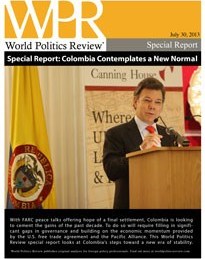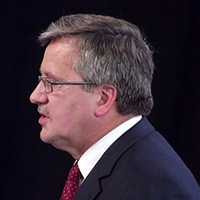
With FARC peace talks offering hope of a final settlement, Colombia is looking to cement the gains of the past decade. To do so will require filling in significant gaps in governance and building on the economic momentum provided by the U.S. free trade agreement and the Pacific Alliance. This World Politics Review special report looks at Colombia’s steps toward a new era of stability. Governance and Security Colombia’s Santos Gambles on FARC TalksBy Frida GhitisSeptember 6, 2012 After It Makes Peace, Colombia Must GovernBy Adam IsacsonApril 12, 2013 Chávez’s Absence Casts Shadow Over Colombia Peace TalksBy Andrew RosatiMarch 5, […]





